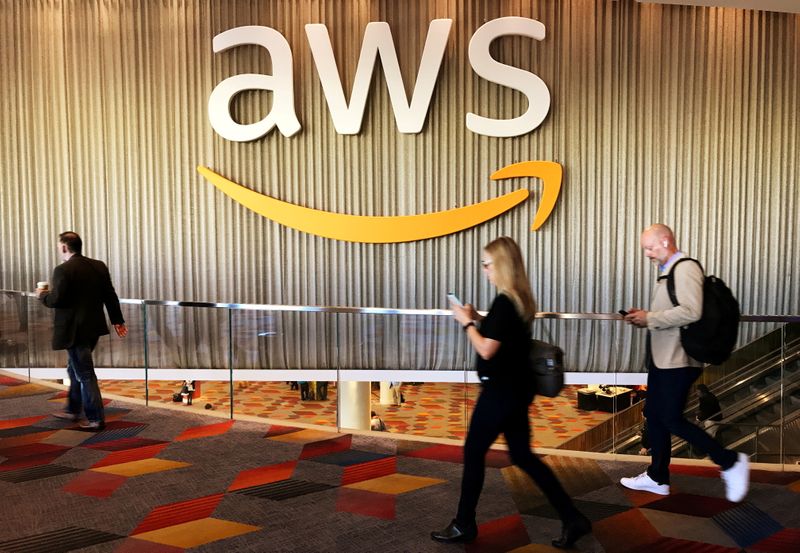© Reuters. FILE PHOTO-Alibaba Group sign is seen at the World Artificial Intelligence Conference (WAIC) in Shanghai, China July 6, 2023. REUTERS/Aly Song
2/2
By Xie Yu and Summer Zhen
HONG KONG (Reuters) – Rather than spur a relief rally in China’s battered tech sector, the past week’s developments at Jack Ma-founded Ant Group have merely reminded global investors of the fickle nature of the country’s regulatory policies and the fragility of the sector.
The initial market reaction when China announced a $984 million fine for the Alibaba (NYSE:) Group affiliate for violating laws and regulations was one of relief, with many market watchers saying it signalled the end of a multi-year regulatory crackdown on the country’s technology sector.
But technology shares, including offshore-listed American depository receipts (ADRs), have barely rallied. Fund managers cite numerous reasons for steering clear of the sector, including stringent regulation in the future and a flagging domestic economy.
“In short, tech policy tightening may have come to an end but will remain tight going forward,” said Jon Withaar, head of Asia special situations at Pictet Asset Management.
“The more accommodative regulatory conditions we saw in the past, which facilitated explosive growth across the platforms, have given way to higher levels of regulation and oversight which will likely mean more moderate growth in the mid to long term.”
Both the Hong Kong-listed shares of Alibaba and its ADRs are up more than 9% since Friday, when the fine was announced. But they still are trading at a third of their price levels in October 2020.
The KraneShares CSI China Internet ETF is up 5.4% since Friday, while back home the CSI Overseas China Internet Index is up nearly 3%.
Yet China tech valuations have been gutted in the nearly 3 years since Ant was forced to shelve its initial share offering, and fund managers see plenty of headwinds, apart from just policy scrutiny. Alibaba shares are traded at 11 times forecast earnings, while rival behemoth Amazon (NASDAQ:) Inc is at 59 times.
“The golden era for these internet companies is evidently over. They have entering a long winter of price competition and market consolidation, an adjustment that is not going to end in one or two years’ time,” says Wong Kok Hoi, founder and CIO of APS Asset Management, which is based in Singapore and manages around $2 billion.
Wong points to intense price competition and monopolistic behaviours as signs the business landscape had toughened. Meanwhile, there were new regulations and more could come.
“It is dangerous to assume that, after the imposition of the fine, Ant financial can now do what it likes,” he said. “Will regulators now ease on enforcement after the fine? Don’t believe so because this is not how regulators in any country work”.
NO DEMAND EITHER
Meanwhile, China’s shoppers are being more frugal even as borders reopened after the pandemic, weighing on demand for China’s fintech firms and online commercial platforms such as Alibaba and JD (NASDAQ:).com, so much so that some of them have stopped publishing the gross merchandising value (GMV) data they used to tout in the past.
Kai Kong Chay, Hong Kong-based senior portfolio manager for Greater China equities at Manulife Investment Management, says he is very selective in picking only services-focused companies with pricing power and penetration, given many others had no structural drivers left.
Derrick Irwin, portfolio manager for Allspring’s intrinsic emerging markets equity team, based in Boston, likewise believes regulatory tightening has ended but that didn’t mean a return to the regime preceding Chinese President Xi Jinping’s ‘common prosperity’ drive and to the lofty valuations then. Alibaba’s ADRs were at $315 then, compared to $90 this week.
“The government has learned that the private sector – particularly the tech sector – is a critical partner in jump-starting growth. The government will continue to exert pressure on key tech companies even as they allow growth to resume,” he said.
For some sell-side analysts, though, China tech has turned a corner.
Morgan Stanley (NYSE:), for instance, has Alibaba as their top pick among Chinese internet companies, with a target price of $150 that implies a more than 60% rise.
Min Lan Tan, head of chief investment office, UBS Global Wealth Management, APAC, based in Singapore, says most investors, particularly institutions and hedge funds, have been staying underweight on China.
“There is actually a lot of value in the internet space in China, and what is really needed is a confidence that growth has stabilized,” she said.
Read the full article here




